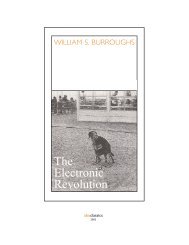Franco ''Bifo'' Berardi - The Soul at Work From Alienation to Autonomy
Franco ''Bifo'' Berardi - The Soul at Work From Alienation to Autonomy
Franco ''Bifo'' Berardi - The Soul at Work From Alienation to Autonomy
Create successful ePaper yourself
Turn your PDF publications into a flip-book with our unique Google optimized e-Paper software.
.<br />
production, exploit<strong>at</strong>ion is exerted essentially on the semiotic flux<br />
produced by human time <strong>at</strong> work.<br />
It is in this sense th<strong>at</strong> we speak of imm<strong>at</strong>erial production. Language<br />
and money are not <strong>at</strong> all metaphors, and yet they are<br />
Itm<strong>at</strong>enal. <strong>The</strong>y are nothing, and yet can do everything: they move,<br />
dIsplace, multiply, destroy. <strong>The</strong>y are the soul of Semiocapital.<br />
If <strong>to</strong>day we want <strong>to</strong> continue the genealogical work of Michel<br />
Foucault, we have <strong>to</strong> shift the focus of theoretical <strong>at</strong>tention <strong>to</strong>wards<br />
the au<strong>to</strong>m<strong>at</strong>isms of mental reactivity, language and imagin<strong>at</strong>ion,<br />
and therefore <strong>to</strong>wards the new forms of alien<strong>at</strong>ion and precariousness<br />
of the mental work occurring in the Net.<br />
In this book I will examine anew the Marxist language which<br />
was domInant rn the 1960s, trying <strong>to</strong> reestablish its vitality with<br />
respect <strong>to</strong> the languages of post-structuralism, schizoanalysis and<br />
cyberculture.<br />
Despite the fact th<strong>at</strong> the term "soul" is never used in the language<br />
of th<strong>at</strong> hls<strong>to</strong>ncal period, I want <strong>to</strong> use it-metaphorically and<br />
even a bit ionicaIlY-in order <strong>to</strong> rethink the core of many questIn<br />
refemng <strong>to</strong> the issue of alien<strong>at</strong>ion. In the Hegelian vision<br />
thiS Issue is defined by th l ' h' b<br />
e re <strong>at</strong>lOns lp etween uman essence<br />
and activity, while in the m<strong>at</strong>erialist vision of Italian <strong>Work</strong>erism<br />
(Operais "!<br />
o), alien<strong>at</strong>ion is defined as the rel<strong>at</strong>ionship between<br />
human time and capitalist value, th<strong>at</strong> is <strong>to</strong> say as the reific<strong>at</strong>ion of<br />
both body and soul. In the Hegelian-Marxist tradition of the 20th<br />
Century,<br />
the concept of "alien<strong>at</strong>ion" refers specifically <strong>to</strong> the rela<br />
.<br />
tion eXIstIg betwee corporeality and human essence. For Hegel<br />
,<br />
the word alren<strong>at</strong>lon (Entausserung) refers <strong>to</strong> the self becoming<br />
other, <strong>to</strong> the his<strong>to</strong>rical and mundane separ<strong>at</strong>ion existing between<br />
the Berng and the existent.<br />
h<br />
In Marx, the concept of alien<strong>at</strong>ion signifies the split between life<br />
and labor, the split between the workers' physical activity and their<br />
humanity, their essence as humans. Young Marx, the author of the<br />
J 844 Manuscripts who was the main reference for the radical philosophy<br />
of the 1960s, <strong>at</strong>tributes a pivotal role <strong>to</strong> the notion of alien<strong>at</strong>ion.<br />
In Marx's parlance, as in Hegel before, alien<strong>at</strong>ion (Entausserung)<br />
and estrangement (Entfi'emdung) are two terms th<strong>at</strong> define the same<br />
process from twO different standpoints. <strong>The</strong> first one defines the<br />
sense of loss felt by consciousness when faced with an object in the<br />
context of capital's domin<strong>at</strong>ion; the second term refers <strong>to</strong> the confront<strong>at</strong>ion<br />
between the consciousness and the scene of exteriority,<br />
and <strong>to</strong> the cre<strong>at</strong>ion of an au<strong>to</strong>nomous consciousness based on the<br />
refusal of its own dependence on work.<br />
Italian <strong>Work</strong>erist thought overturned the vision of Marxism<br />
th<strong>at</strong> was dominant in those years: the working class is no longer<br />
conceived as a passive object of alien<strong>at</strong>ion, but instead as the<br />
active subject of a refusal capable of building a community starting<br />
out from its estrangement f<strong>to</strong>m the interests of capitalistic society.<br />
Alien<strong>at</strong>ion is then considered not as the loss of human<br />
authenticity, but as estrangement from capitalistic interest, and<br />
therefore as a necessary condition for the construction-in a<br />
space estranged from and hostile <strong>to</strong> labor rel<strong>at</strong>ions-of an ultim<strong>at</strong>ely<br />
human rel<strong>at</strong>ionship.<br />
In the context of French Post-Structuralism, a similar overturning<br />
of the traditional vision of clinical alien<strong>at</strong>ion was finding<br />
its way: schizophrenia, considered by psychi<strong>at</strong>ry only as the separ<strong>at</strong>ion<br />
and loss of self-consciousness, is rethought by Felix<br />
Gu<strong>at</strong>tari in <strong>to</strong>tally new terms. Schizophrenia is not the passive<br />
effect of a scission of consciousness, but r<strong>at</strong>her a form of consciousness<br />
th<strong>at</strong> is multiple, prolifer<strong>at</strong>ing and nomadic.<br />
22 / <strong>The</strong> <strong>Soul</strong> <strong>at</strong> <strong>Work</strong><br />
Introduction / 23




